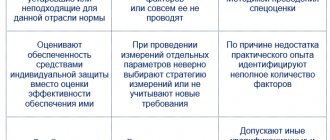general information
Standard working conditions are not typical for every type of profession and position.
To compensate for the inconvenience associated with significant deviations, officials have provided for certain types of compensation. The current version of the Labor Code guarantees that work in conditions deviating from normal conditions is subject to increased payment. The provisions of the Labor Code of the Russian Federation establish the minimum amounts of compensation additional payments. Employers have the right to increase the amount of bonuses for work with deviations from standard conditions. But employers do not have the right to reduce payments.
What conditions should not be considered normal:
- Harmful and dangerous industries.
- Special climatic locations (regions of the Far North and equivalent areas).
- Night shifts, hours.
- Recruitment to work overtime.
- Work on weekends and holidays.
- Combination of professions or positions.
- Perform duties of various qualifications.
- Development of new production facilities.
For each of the listed grounds, an individual remuneration procedure is provided. But in all cases, wages in case of deviation from normal conditions are assigned at an increased rate.
Explanations of Rostrud on wages in conditions deviating from normal
In the previous part: About remuneration in general
Remuneration for labor in special conditions and other cases of work performed in conditions deviating from normal conditions is made in an increased amount (due to the payment of appropriate compensation).
Special working conditions include:
1) work under harmful or dangerous working conditions;
2) work in the Far North and equivalent areas.
Important! In the following cases, wages are paid taking into account compensation for work under conditions deviating from normal:
1) work at night;
2) performing work of various qualifications;
3) when combining professions (positions);
4) overtime work;
5) work on weekends and non-working holidays;
6) when developing new industries (products).
Working with harmful or dangerous working conditions
The wages of workers working in harmful or dangerous working conditions are set at a higher rate than normal working conditions.
Important! The minimum increase in wages for work in harmful or dangerous conditions is 4% of the tariff rate (salary) established for various types of work with normal working conditions.
The specific amounts of increased wages for work in hazardous conditions are established by the employer, taking into account the opinion of the representative body of employees.
Important! If the employer does not have a representative body of employees, the specific amounts of increased wages are established by the employment contract with the employee.
The specific amount of wage increase for workers with harmful or dangerous working conditions can be determined in the collective agreement (if there is one).
Night work
The employer is required to pay higher amounts for night work (compared to work under normal conditions). Night time is considered to be the period from 22:00 to 6:00.
Important! The minimum amount of increased wages for work at night is established by the Government of the Russian Federation for all remuneration systems and is 20% of the hourly wage rate for each hour of work at night (or 20% of the salary calculated for an hour of work at night). The employer is obliged to pay for night work at least at the specified rates.
The additional payment is calculated only on the hourly tariff rate or salary calculated per hour of work (without taking into account other additional payments and/or allowances received by the employee).
The specific amount of increased pay for night work is established by the employment contract with the employee.
Important! If the organization has a representative body of workers, the specific amount of the increase in wages for night work can be established by a local act adopted taking into account the opinion of the representative body of workers.
In addition, the amount of increased wages for night work may be provided for in the collective labor agreement (if there is one).
Work in special climatic conditions
1. Work in the Far North and equivalent areas
Important! For work in special climatic conditions, remuneration is made using regional coefficients and percentage bonuses to wages.
The sizes of regional coefficients and percentage premiums are established by the Government of the Russian Federation and regulations of the former USSR.
State authorities of the constituent entities of the Russian Federation and local self-government bodies have the right to establish higher levels of regional coefficients than those established by the Government of the Russian Federation or regulations of the former USSR.
Important! The procedure and conditions for calculating the percentage premium:
- having work experience in the Far North or equivalent areas for at least six months. When calculating, the length of service is summed up regardless of the duration of the break in work and the grounds for termination of the employment relationship;
- increase in the bonus for every six months of work, then for each year of work - by 10 percent (up to 80 - 100 percent of wages - depending on the region of the Far North, until reaching 50 percent of wages - for areas equated to RKS).
Important! The procedure and conditions for calculating the youth bonus (for employees under 30 years of age):
- having work experience in the Far North or equivalent areas for at least six months. When calculating, the length of service is summed up regardless of the duration of the break in work and the grounds for termination of the employment relationship;
- residence in the Far North or equivalent areas - at least 1 year;
- increase in the bonus for every six months of work, then for each year of work (for RKS), for every six months of work (for MKS) (until reaching 80 percent of wages - RKS, 50 percent of wages - MKS).
Work in arid, high mountain and desert areas
Important! For work in arid, high-mountain and desert areas, remuneration is made using appropriate coefficients to wages.
The procedure and conditions for applying the coefficient are established by regulatory legal acts at the federal level.
Carrying out work of various qualifications
Qualification is the degree of professional training and preparedness of an employee to perform a job function in a specific specialty.
Important! When remunerating labor for performing work of various qualifications, the employer must comply with the following procedure:
1) with time-based wages - the employee is paid for work with a higher qualification;
2) with piecework wages - the employee’s labor is paid according to the rates of the work he performs.
Important! When entrusting an employee (due to the nature of production) with piecework wages to perform work that is charged below the category assigned to the employee, the employer is obliged to pay the employee the difference between grades.
Combination of professions (positions)
The combination of professions (positions) is carried out within the framework of one employment contract. This is its difference from internal part-time work. Combination of professions (positions) is carried out without exemption from the main job. This is different from a temporary transfer to another job.
Important! This type of increased pay includes the following types of additional work performed by an employee during the working day without release from his main job:
- combination of professions (positions);
- expansion of service areas;
- increase in the volume of work;
- performance of duties (part of them) of a temporarily absent employee, whose place of work is retained.
Important! The amount of additional payment for performing the specified work is determined by agreement of the parties to the employment contract, taking into account the content and volume of additional work. The maximum amount of additional payment is not limited by law.
Overtime work
Overtime work is work performed by an employee at the initiative of the employer outside the working hours established for the employee: daily work (shift), and in the case of cumulative accounting of working hours - in excess of the normal number of working hours for the accounting period.
Overtime work is paid at an increased rate. Specific amounts of increased pay may be established in a collective agreement, local regulation or employment contract.
Increased pay for work outside the normal working hours on non-working holidays cannot be paid twice (first as for overtime work, and then as for working on a holiday).
Important! Minimum amount of increased pay for work beyond normal working hours:
1. For employees receiving a monthly salary:
- the first two hours - in the amount of one and a half hourly rate (part of the salary for a day or hour of work) in addition to the salary;
- subsequent hours - in the amount of double hourly rate (part of the salary for a day or hour of work) in addition to the salary.
2. Employees whose work is paid at daily or hourly tariff rates,
- at the rate of one and a half daily or hourly rate for the first two hours and double daily or hourly rate for subsequent hours.
3. For piece workers:
- the first two hours are paid at no less than one and a half piece rates, the subsequent hours - at least double piece rates.
Important! At the request of the employee, overtime work, instead of increased pay, can be compensated by providing additional rest time, but not less than the time worked overtime.
Work on weekends and non-working holidays
Remuneration at least double the amount is made in the following cases:
- the employee worked on the day off (days) established for him by the VTR Rules,
If for an employee, according to the VTR Rules, Saturday and (or) Sunday are not days off, and days off are provided to him on other days of the week, then Saturday and Sunday are regular working days for him and are paid in a single amount.
- the employee worked on one (several) non-working holidays established by Art. 112 of the Labor Code of the Russian Federation.
Important! The minimum amount of increased wages for work on a weekend or holiday:
- for piecework wages - at double piecework rates;
- when remunerating labor at daily and hourly tariff rates - at a double daily or hourly tariff rate;
- employees receiving a salary (official salary) - depending on the standard working hours worked in the month.
Important! Employees receiving a salary (official salary) are paid for work on holidays and weekends in the following order:
- if work on a day off was carried out within the limits of the monthly working time norm - in the amount of a single daily or hourly tariff rate (part of the salary (official salary) for a day or hour of work) in excess of the salary (official salary);
- if work on a day off was carried out in excess of the monthly standard working time - in the amount of double the daily or hourly tariff rate (part of the salary (official salary) for a day or hour of work) in excess of the salary (official salary).
Important! Specific amounts of increased wages for work on a weekend or holiday can be established by a collective agreement, a local act (adopted taking into account the opinion of the representative body of workers), or an employment contract.
At the request of the employee, instead of increased pay, work on a day off can be compensated by providing another day of rest. In this case, payment for work on a day off is made in a single amount, and the other day of rest provided is not paid.
Important! Payment for work on weekends and holidays for creative workers indicated in the list of positions, approved. Decree of the Government of the Russian Federation dated April 28, 2007 N 252, is determined by a collective agreement, local act, or employment contract.
Development of new industries (products)
During the period of development of new industries (products), the employee may retain the same salary.
Important! The possibility of maintaining the same salary is provided for in the collective agreement (if any) or the employment contract.
The term “previous salary” should be understood as the average employee’s earnings, calculated according to the rules of Art. 139 Labor Code of the Russian Federation.
In the next part: Possible cases of salary reduction
From the report of Rostrud for the third quarter of 2017
Harmful and dangerous work
The minimum amount of additional payment for harmfulness or danger is 4% of the established tariff rate of the employee or his official salary. The percentage may be increased by the employer's decision.
The amount of compensation premiums for harmfulness should be determined taking into account the opinion of a representative body, for example a trade union. If the institution does not have one, then special standards must be outlined in the employment contract with the employee.
The harmfulness or danger of a particular production must be confirmed by an expert opinion. Previously, workplace certification acted as an expert opinion. It was replaced by a new type of examination - SOUT (special assessment of working conditions). If, according to the results of the assessment assessment, the place of work of a particular specialist is classified as harmful or dangerous, then it is necessary to establish a compensatory additional payment.
Example
The employee's salary is 30,000 rubles. Based on the results of the assessment and safety assessment, the workplace was classified as hazardous. According to the organization’s collective agreement, the additional payment for harmful activities is 10% of the official salary.
The amount of the compensation bonus: 30,000 × 10% = 3,000 rubles.
Overtime work
An employee may be involved in the performance of his job duties beyond the standard regime. For example, the boss asked to stay after work to complete the preparation of the project. Then, for overtime hours, the employee is entitled to increased pay.
Article 152 of the Labor Code of the Russian Federation establishes the minimum values of compensatory additional payments. The employer has the right to increase bonuses. The employer must pay no less than 1.5 times the established wage for the first two hours worked overtime. For the rest of the time worked overtime, at least double pay is due.
Example
The employee is required to work overtime. His hourly rate is 400 rubles. The processing time was 4.5 hours. Let's calculate the surcharge:
- for the first two hours: 2 hours × 1.5 × 400 rubles = 1200 rubles;
- for the rest of the time: 2.5 hours × 2 × 400 rub. = 2000 rubles;
- total = 1200 + 2000 = 3200 rubles
IMPORTANT!
The provisions of the Labor Code of the Russian Federation provide for the right to replace an increased allowance with additional rest time. Payment is made as standard, and the employee has the right to additional time off.
It is necessary to decide whether an employee will use time off no later than the last day of the month in which he worked overtime. Do not forget to obtain a written application from the specialist for additional rest time.
What is normal working conditions?
In order for workers to carry out the established volumes of work, employers are obliged to provide conditions that correspond to normal ones.
Attention! According to the provisions of Art. 163 of the Labor Code of the Russian Federation (hereinafter referred to as the Code), in order for them to be recognized as such, it is necessary:
- that machinery, equipment, technological equipment, premises and buildings are in good working order;
- workers must be provided with technical and other necessary documents on time;
- all materials, tools and other means required for the performance of labor duties must be of proper quality and issued to workers in a timely manner;
- compliance of working conditions with the standards of labor protection and safety of the production process.
Weekends and holidays
Engaging an employee to work on a weekend or holiday also guarantees increased pay. Holidays are the same for all Russians; they are enshrined in Article 112 of the Labor Code of the Russian Federation. On weekends things are different.
An increased compensation bonus is due only for those days of work that, according to the employee’s work schedule, are considered days off and which are noted in Article 112 of the Labor Code of the Russian Federation as holidays. For the average specialist, a five-day week is Saturday and Sunday. For six-day workers - only Sunday. And for those who work in shifts, days off are determined according to the approved work schedule. If a citizen had to work on a day indicated in the schedule as a day off, then he must be paid for this time at an increased rate.
The minimum amount is established by Article 153 of the Labor Code of the Russian Federation: work on a weekend or holiday must be paid at least double the amount. The employer has the right to increase the amount of payment.
And the employee has the right to replace increased pay with additional rest time. For example, extend your vacation. To do this, you must submit a written application addressed to the manager with a request to provide time off for working on a weekend or holiday.
Example
In the billing month, the employee was recalled to work: once on a holiday, once on a day off. The daily tariff rate is 1000 rubles. For one holiday, the employee demanded time off:
- payment for a holiday: 1000 × 1 day × 1 size = 1000 rubles, since time off was received for this day;
- payment for a day off: 1000 × 1 day × 2 size = 2000 rubles, time off was not provided.
In total, the additional payment for weekends and holidays amounted to 3,000 rubles.
Remuneration for work of various qualifications
Qualification is a set of professional skills, knowledge and level of training of a citizen in the field of performance of labor duties in a certain profession of an employee.
Performing work with different qualifications implies the following forms of remuneration:
- if payments are made on a time-based basis and work is performed that requires higher qualifications, it is paid in the amount provided for highly paid work;
- If the work is paid by the piece, the amount of payments is made depending on the job functions performed.
Important! If workers, whose work is paid by the piece due to the nature of the production process, need to perform work for which the payment is lower than that provided for by their grades, the employer is obligated to pay them the difference between grades.
If a combination of professions (positions) occurs, service areas are expanded, the volume of work increases, or a citizen performs the labor functions of an employee who is temporarily absent from the workplace, and is not released from the work duties specified in the employment agreement, additional payment is provided (Art. 151 of the Code).
Positions and professions are combined:
- within the boundaries of one employment agreement (this is the difference between part-time and internal part-time work);
- at the same time, the employee is not relieved of his main work responsibilities (the difference between part-time and temporary transfer).
The additional payment is made in the amount agreed upon by the employee and the employer, taking into account the content and (or) scope of additional duties (Article 60.2 of the Code).
Attention! Our qualified lawyers will assist you free of charge and around the clock on any issues. Find out more here.
Work at night
Night work is also subject to increased payment, according to Article 154 of the Labor Code of the Russian Federation. Remuneration for work in conditions deviating from normal conditions, in terms of night time, is also enshrined in Government Decree No. 554 of July 22, 2008. Night time is recognized as the period from 22:00 to 6:00 hours.
The amount of the bonus cannot be less than 20% of the official salary or tariff rate calculated for each hour of night work. Other types of allowances and wages received by the employee cannot be included in the calculation of extra pay for night shifts. Regulatory provisions need to be enshrined in the collective agreement, the employment contract with the employee, as well as in the local regulations on remuneration.
Example
Tariff rate - 200 rubles per hour. Worked 160 hours (standard), including 68 hours at night. Supplement for length of service - 10%. Supplement for night stays - 25%. Let's do the calculation:
- We calculate the salary: 160 × 200 = 32,000 rubles;
- bonus for length of service: 32,000 × 10% = 3,200 rubles;
- surcharge for overnight stays: 200 × 68 hours × 25% = 3400 rubles.
Total: 38,600 rubles (32,000 + 3200 + 3400).
The calculation of night rates does not include additional payment for length of service, since the calculation should be made solely based on the tariff rate or official salary.
What can be considered a deviation from normal conditions?
In Art. 149 of the Code sets out the basic principles of remuneration for work if an employee fulfills his job duties and the working conditions do not correspond to normal ones.
According to the Labor Code of the Russian Federation, conditions that do not correspond to normal include:
- performing job duties that require different qualifications;
- if the worker combines professions (positions);
- work beyond the prescribed period;
- work at night;
- work on weekends and holidays, if they are recognized as non-working;
- carrying out work in other conditions that do not correspond to normal ones (for example, when working in new industries or with new products).
Such cases also include performing hard work, work duties in harmful, dangerous and other special conditions, work in areas with a harsh climate (Article 146 of the Code).
Labor legislation and relevant laws, collective agreements, internal company documents, labor agreements provide for an increased level of payments to persons who work in conditions different from normal ones, and their amount cannot be less than those provided for by laws governing labor relations.







